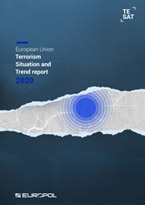 Europol
Europol
Overview: The European Union (EU) Terrorism Situation and Trend Report (TE-SAT) 2020 seeks to record basic facts and assemble figures regarding terrorist attacks and arrests in the EU in 2019. It is based on quantitative and qualitative data on terrorist offences in the EU and data on arrests of people suspected of involvement in those offences, as confirmed by EU Member States. In addition, Europol’s cooperation partners in third-party countries provide valuable qualitative information and assessments that enrich the findings of the report. The report also includes information on convictions and acquittals for terrorist offences provided by Eurojust based on data shared by EU Member States. The EU Directive 2017/541 on combating terrorism , which all EU Member States were obliged to transpose in their national legislation by 8 September 2018, specifies that terrorist offences are certain intentional acts which, given their nature or context, may seriously damage a country or an international organisation when committed with the aim of:
- seriously intimidating a population;
- unduly compelling a government or international organisation to perform or abstain from performing any act; or
- seriously destabilising or destroying the fundamental political, constitutional, economic or social structures of a country or an international organisation.
The shared legal framework created by the EU Directive 2017/541 makes comparing data relating to terrorism from different EU Member States meaningful. On this basis, the TE-SAT provides statistical data on terrorism in EU Member States. On a national level, terrorism legislation varies within the limits set by this Directive, as EU Member States retain flexibility when legislating.
The TE-SAT reflects EU Member States’ definitions of terrorist offences according to national legislation. In the statistics, violent incidents that are classified by national authorities as terrorism are counted as terrorist attacks.
Included as arrests are those judicial arrests warranted by a prosecutor or investigating judge, whereby a person is detained for questioning on suspicion of committing a criminal offence for which detention is permitted by national law. Conviction rates in the EU are generally high, but the numbers of those arrested within the preceding year and those eventually convicted of terrorist offences may differ.
In addition, the TE-SAT mentions specific violent extremist acts and activities, as reported by EU Member States, to provide a more comprehensive picture of the terrorism situation. Whereas there is no universally agreed definition of extremism, extremists generally aim to replace the liberal democratic order and alter the fundamental constitutional principles linked to it. Terrorism, therefore, can be considered to be a set of violent tactics employed mainly by extremists.
